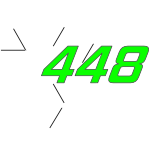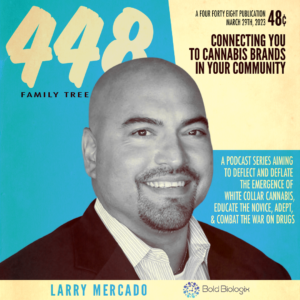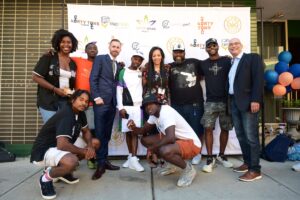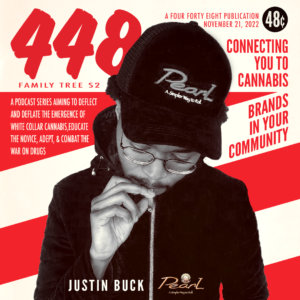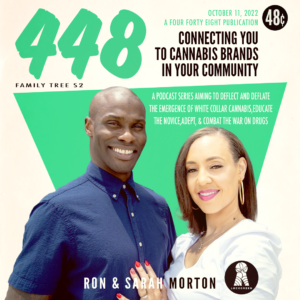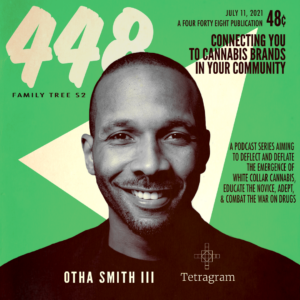Family Tree: Jabari Byrd, The Hemp King
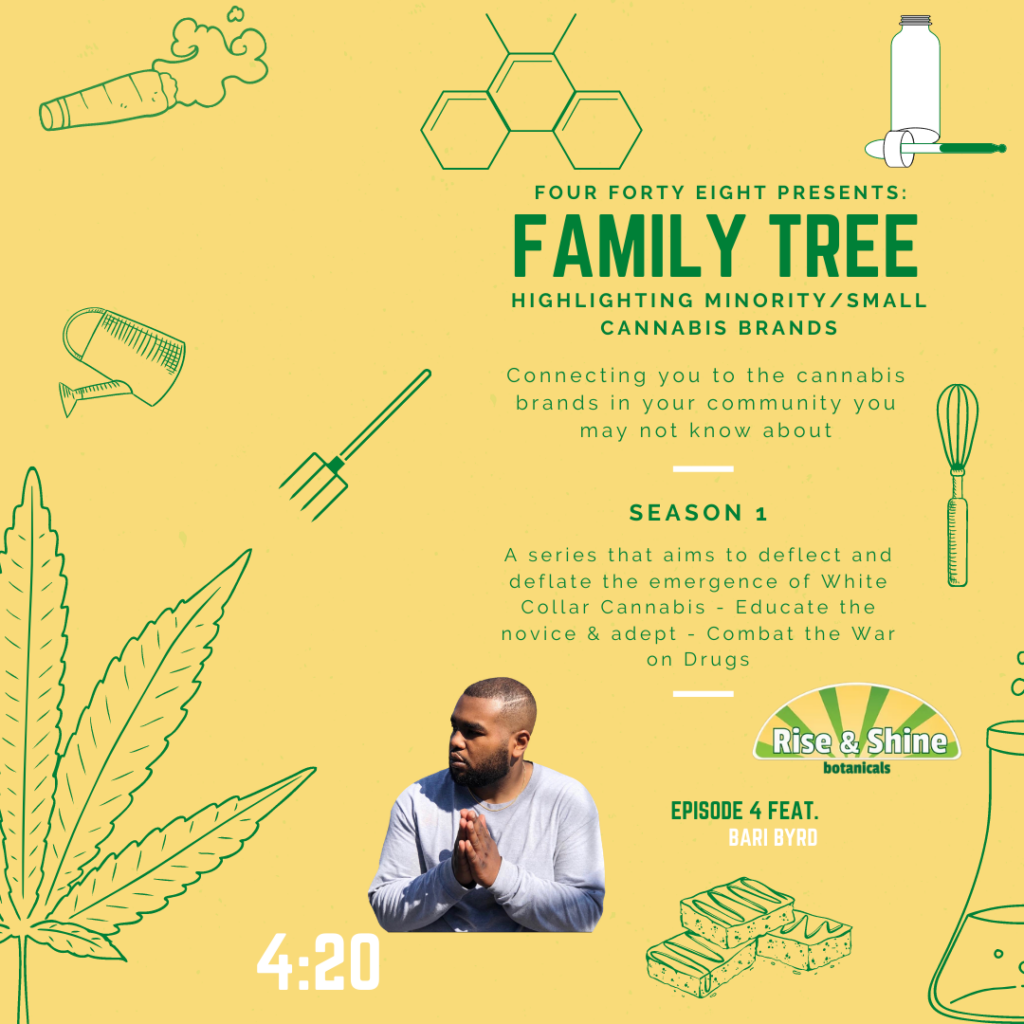

For the last seven years, Jabari Byrd has submerged himself in the dirt. He has learned the cannabis plant from seed up, sprouting into a budding encyclopedia of knowledge as the result. It was in his early days as an undergrad at Virginia Tech that he began to familiarize himself with the versatility of the plant and further recognized its importance. His insatiable hunger for knowledge grew when he stumbled on the potential of cannabis being a prime component for sustainability on the industrial front. Seeing cannabis as a resource for wellness and sustainability drove home the point of importance for Byrd.
While attending Virginia Tech he earned a B.A in Biochemistry & Agriculture, topping it off with a M.S in Plant Science. These credentials have solidified his credibility in the industry and allowed him to position himself as an industry renaissance man. He has spoken on panels at cannabis conferences and events, all while co-owning Virginia based CBD company Rise & Shine Botanicals, where he manufactures products from seed to shelf with an unmatched level of dedication. This dedication is what drove Byrd, who is in charge of managing farm operations and cultivating the CBD products, to try growing and cultivating six acres on his own. Biting off more than he can chew humbled him to scale back to about 2 acres this season.
Their store has a cafe which offers wellness options such as CBD infused Shakes, Smoothies, Expressos, & Teas. Byrd’s long term goal is to spread the knowledge and importance of agriculture and sustainability in our communities. As well as combat the lingering effects of sharecropping. So we at 448 sat down with Byrd to discuss his endeavors, and below are his answers, lightly edited for style and grammar.
Q: Can you identify some of your credentials and what you plan to do with your platform that you have created for yourself?
A: “Right now I’m in my store “Rise N Shine Botanicals”. We’re currently closed but we have a café where we have a variety of shakes, smoothies, espresso drinks, tea’s and you can add any of our herbal boosts to them and some of the other drink boosts like CBD oil and hemp products for beneficial protein consumption. I’m co-owner of the store here, and it’s gaining a lot of momentum. We opened the store right before the coronavirus hit us all hard, so right now I’m just operating on my online platform riseandshinebotanicals.com
Our main seller is my full spectrum CBD oil. I have 950 MG, 1900 MG, and 3800 MG, all at affordable prices, given the quality and how concentrated these products are. We even have massage oil, dietary supplements, creams, and bath salts. I’m just in charge of all the CBD products and the growing operation that we farm as well.
This year I’m growing only two acres. In those two acres are about 2,000 to 2,500 plants. All of those plants will be used to manufacture the products we have here, allowing us to continue to produce, and be a reliable source for CBD products. My main goal was to have control from seed to shelf with quality. We finally got it here and I’m very happy about that.”
Q: How important would you say it is for a CBD company to farm from seed to shelf in the eyes of customers as opposed to white labeling?
A: “It depends on what market you’re in. I don’t see an issue with white labeling in larger markets, but when you’re in smaller cities like me out here in Montgomery county, Virginia it’s not a lot of people here. It’s a little bit easier for folks to get to know you, to know the farmer themselves, and to have a sense of overall comfortability with the products that they’re taking, versus what’s being sold in the gas stations and larger outlets like Kroger. Not to say that those products aren’t good, but at least from the seed to shelf standpoint, consumers know what I harvest, and that the products that we make are all pretty fresh compared to products that have been sitting in a warehouse and have been there for a while.
That’s the feedback that I get a lot of people say that my tincture tastes fresh, clean and that’s all because I’ve processed it. It’s good to know what practice the farmers are using, vs. in the black market where you’re getting your marijuana from Timbuktu! You don’t even know who grew it. I’ve had friends in the past who have dealt with bath salts being in marijuana.
Personally, I’m allergic to Neem oil. Which is a common tincture used in the industry as a spray to repel non beneficial pests. For me going through those experiences that’s what played a part in the equation of why it was important for me to start a seed to shelf business. I’m open to everybody. I try to be easy to communicate with and any questions that you have you can ask from seed to shelf versus somebody at Kroger who can only tell you about the concentration of the bottle.
I can tell you that it has been growing with the use of organic or synthetic soil. Most growers use a combination, I can get into the depth of what I use. It’s all about trust these days because with us not being under the FDA and a lot of the products not being regulated it’s a lot of snake products out there. I’m just trying to do my part and trying to turn all that around as much as possible.”
Q: What would you say that it was that brought you to cannabis?
A: “I dabbled in high school just like a lot of others. I just knew that I enjoyed that versus getting drunk to be honest. When I got to college I started intaking more cannabis too, it allowed me to focus more on my studies when I was a biochemistry major and chemistry minor at Tech. I didn’t see a skyrocket in my grades until then to be honest. I was just brought in from the THC standpoint.
When in my last senior year I kept seeing these documentaries on CBD. Specifically the “Charlotte’s Web” documentary. Talking about Charlotte; RIP Charlotte she just passed away due to corona. That’s what sparked my interest and honestly I didn’t find this (cannabis), God brought this to me. Right after I saw that documentary I saw that Tech was bringing in a hemp program. I asked God “Is this what you want me to do?” Then I took the leap of faith and sent an email to the director of the program. They told me that they didn’t have any funding to bring anybody in.
Initially I just wanted to work, they told me if I wanted to be involved I had to get my own scholarship and I would have to become a graduate student. At the time I didn’t have the actual grades to get into grad school but I had the network. I’ve always been big on networking. I had a pretty reliable name around the university just given what I was doing outside of school for the University.
I was able to get my own scholarships and become a George Washington Carver scholar which allowed me to conduct research on cannabis/hemp for the whole state. I thought this could be the next big cash crop for farmers given the soybeans situation now. I never foresaw me opening up a CBD store with my partners and I started off with selling CBD honey sticks when I was doing Uber and Lyft. I was telling people that it would help them with their hangover the next day and that’s how I got started with all of this. That was my hustle and my hustle turned into a legal business which is crazy!”
Q: What do you think this plant can do for our society once legalized? And why should people educate themselves on it?
A: “I have specific talks on just the endocannabinoid system (eCS), which everyone has in their body. In the short scheme of things, the cannabinoids are the keys and our eCS are the locks to our bodies. For example when you’re taking in bud just off the street yes it’s THC but it still has those small percentages of CBD, CBN, & CBG. Some of those cannabinoids are beneficial for more specific reasons than others.
I’ve used CBD to help people with sleep, pain and eating disorders. You also have CBN which is becoming very popular where that’s viewed as more of a sedative one. And you have CBG which is helping people with eating disorders and what not. CBG is actually the parent molecule to THC and CBD. It is the dinosaur, so CBG is pretty much good for I wouldn’t say all across the board but we’re going to start seeing more people being treated with CBG rather than THC and CBD as well.
We can completely change our society around with both forms of cannabis because you have the hemp form and you have the marijuana farm. So on the hemp side you can start building houses that are carbon negative. They will be mold free and you can build each portion of the house from a plant. From carpeting, to paneling, to the insulation.. We can also stop destroying all these trees here that are meant to be here on this earth, and we can grow hemp instead. With 1 acre of hemp you can get a lot more of the beneficial fibers than from trees we cut down.”
Q:With your educational background, you have more experience with the plant that most. What are some uncommon components of the plant that are beneficial to our bodies or overall well-being we should know?
A: “There is also a whole other side where you have the acidic forms of all these cannabinoids too. So you have THCA, CBDA, & CBGA. All of these acid forms are what they’re learning in places like in Israel and Switzerland. They’re learning that the acid forms are good or better for us to take as opposed to just smoking in and breaking down the carbons or decarboxylation. Basically to explain that in the short run is when you put your bud in the blunt at the time it’s in THCA form, until you light that lighter up or expose that bud to heat then yes you’re inhaling THC because it’s burning the carbon off of the THCA molecule to turn it into THC.
That’s because it’s the same as CBD and CBG, but for example a lot of people for a long time thought that Crohn’s disease would be just helped with THC but now they’re saying that it’s more beneficial for THCA to help with Crohn’s disease than THC. So that’s simply you just not smoking it but you’re eating the bud raw, and so there’s just so much more to learn because there’s only 118 known cannabinoids right now but I’m pretty sure there’s thousands. We need to be a part of that as a people and educating our people and healing our communities with it as well.”
“You know, I’m trying to use this as a gateway to promote black agriculture just in a reverse fashion. I like to hear that there’s other folks of color doing well in this industry and doing their part. We need more, there is a lot of room.”
Jabari Byrd
Q: This plant can be our “cotton”. Our generational wealth. What way(s) should we be looking to enter the industry?
A: “From the agricultural aspect. I’m trying to use this to promote agriculture because I know agriculture for so many years has pushed our people away from it because of the past with slavery and what not. But when kids can see this you can grow it outdoors and you can simply teach them how to grow a cannabis plant if they can grow that, they can grow anything and they can start growing their own food. You know, I’m trying to use this as a gateway to promote black agriculture just in a reverse fashion.
I like to hear that there’s other folks of color doing well in this industry and doing their part. We need more, there is a lot of room. We’re at a time now where this is the beginning of the apple, and I just want to get as many people in as possible without killing myself. That’s what I found myself doing last year, trying to do too much and not taking care of my own home. There are other ways of doing it, like starting off a YouTube channel for growing and marketing and getting into the industry. But you’re part of it is the most critical piece because it’s the educational piece so I want to continue to help you out as much as possible.”
Thanks for reading! For a variety of CBD, Hemp, and other botanical products that can help you feel your best everyday please visit Bari’s site. Also, please be sure to check out our previous interview in the Family Tree series with Taylor and Julian Jones here. Stay tuned for more interviews that can only be found at FourFortyEight.
Follow Jabari on his IG:
